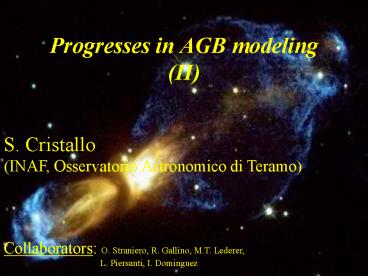Progresses in AGB modeling II - PowerPoint PPT Presentation
1 / 26
Title:
Progresses in AGB modeling II
Description:
C-enhanced low temperature opacities: why we need it ... Izzard et al. Karakas et al. FRANEC. 1.91e-7. Ba. M2 Z2m2. M2 Z2m2 (ETA=4) M2 Z2m2. M2 Z2m2 ... – PowerPoint PPT presentation
Number of Views:22
Avg rating:3.0/5.0
Title: Progresses in AGB modeling II
1
Progresses in AGB modeling(II)
S. Cristallo (INAF, Osservatorio Astronomico di
Teramo)
Collaborators O. Straniero, R. Gallino, M.T.
Lederer, L. Piersanti, I. Dominguez
2
OUTLINE
- C-enhanced low temperature opacities why we need
it - Evolution and nucleosynthesis of M2MSUN with
- Comparison with observations
- Future works
- Z 1.4 x 10-2 (disk stars)
- Z 3.0 x 10-3 (SMC)
- Z 1.0 x 10-4 (halo stars)
3
AGB stars
CORE
MAIN REFERENCES
Chieffi et al. 1998 Straniero et al.
2005 Cristallo 2006, PhD Thesis()
ENVELOPE
() available at http//www.oa-teramo.inaf.it/osse
rvatorio/personale/cristallo/pag_in_eng.html
4
Molecular opacities
Atomic opacities
Molecular opacities
Grains
T
2000 K
4000-5000 K
See Michail Lederers talk
() Cristallo et al. 2007 (ApJ, 667, 489)
5
Z1.0x10-4
First TDU episode and consequent 13C-pocket
formation
14 Pulses with TDU
C/O50
C/O8
Radiative burning of 13C(a,n)16O reaction
6
Interpolation with metallicity
C ? Fe ?
With interpolation overestimation of Fe
contribution to opacity Without interpolation
underestimation of C contribute to opacity
7
The effect of the new opacities
Physics
Nucleosynthesis
ed
ed
Z-int temperature matches, but overabundances
are too low Z-fixed overabundances match, but
temperatures is too large CN-int temperature and
overabundances agree with observations
8
Z3.0x10-3
First TDU episode and consequent 13C-pocket
formation
11 Pulses with TDU
C/O10
C/O1.6
C/O0.7
Radiative burning of 13C(a,n)16O reaction
9
Theory vs. Observations (1)
BMB-B 30 belongs to SMC Fe/H-1
Best fit for the s-process
10
Theory vs. Observations (2)
BMB-B 30 belongs to SMC Fe/H-1
FRANEC Fe/H-0.67
11
Z1.4x10-2
C/O1.9
11 Pulses with TDU
C/Ogt1
12
Comparison with Galactic Carbon Stars (disk
metallicity Z Z? )
Surface C/O1
INI
END
Abia et al. 2002 FRANEC ( 6th pulse with
TDU)
Standard error
13
Z-int model vs. CN-int model at ZZSUN
Z-int model CN-int model
Variations are within 15 (0.06 deX)
Plotted elements with X/Fegt0.1 during the AGB
14
The s-process RESUME
Z1.4x10-2 Z 3.0x10-3 Z1.0x10-4
Final distributions
15
19F and 23Na nucleosynthesis
16
Main 15N (and then 19F) sources
P
13C
13C(a,n)16O 14N(n,p)14C 18O(p,a)15N
1
17
13C left in H-shell burning
At the 4th TP with TDU (ZZ?) responsible of 65
of 19F
Depending on the 13Ceq in the H-shell burning
ashes
(ZZ?)
(Z10-4)
18
Main 23Na sources
P
13C
EFFICIENT AT LOW Z
19
Z1.4x10-2 Z 3.0x10-3 Z1.0x10-4
- AGBs are efficient 19F and 23Na polluters at low
metallicities - Their abudances give us informations on the
numbers of TPs
20
19F AT SOLAR METALLICITY
OBSERVATIONAL DATA Jorissen et al. 1992 AA 261,
164
THEORETICAL MODELS Lugaro et al. 2004 ApJ 615, 934
21
19F AT LOW METALLICITY
HE 13050132
Fe/H -2.50.5 Teff 4462100 log g 0.80.3
22
YIELDS comparison with other authors at ZZSUN
23
YIELDS comparison with other authors at ZZSMC
24
YIELDS comparison with other authors at
Z1.0x10-4
25
THE STATE OF THE ART
- First AGB models calculated with C-enhanced low
- temperature opacity coefficients
- Effects of new opacities on the physical and
chemical - evolution of AGB models at different
metallicities
IN THE FUTURE
- Compute models at lower metallicities and lower
masses in order to explore the effects induced by
proton ingestions - Enlarge the current set of AGB models by
exploring a wider range of masses and by
increasing the current metallicity grid
26
THANK YOU!!!































